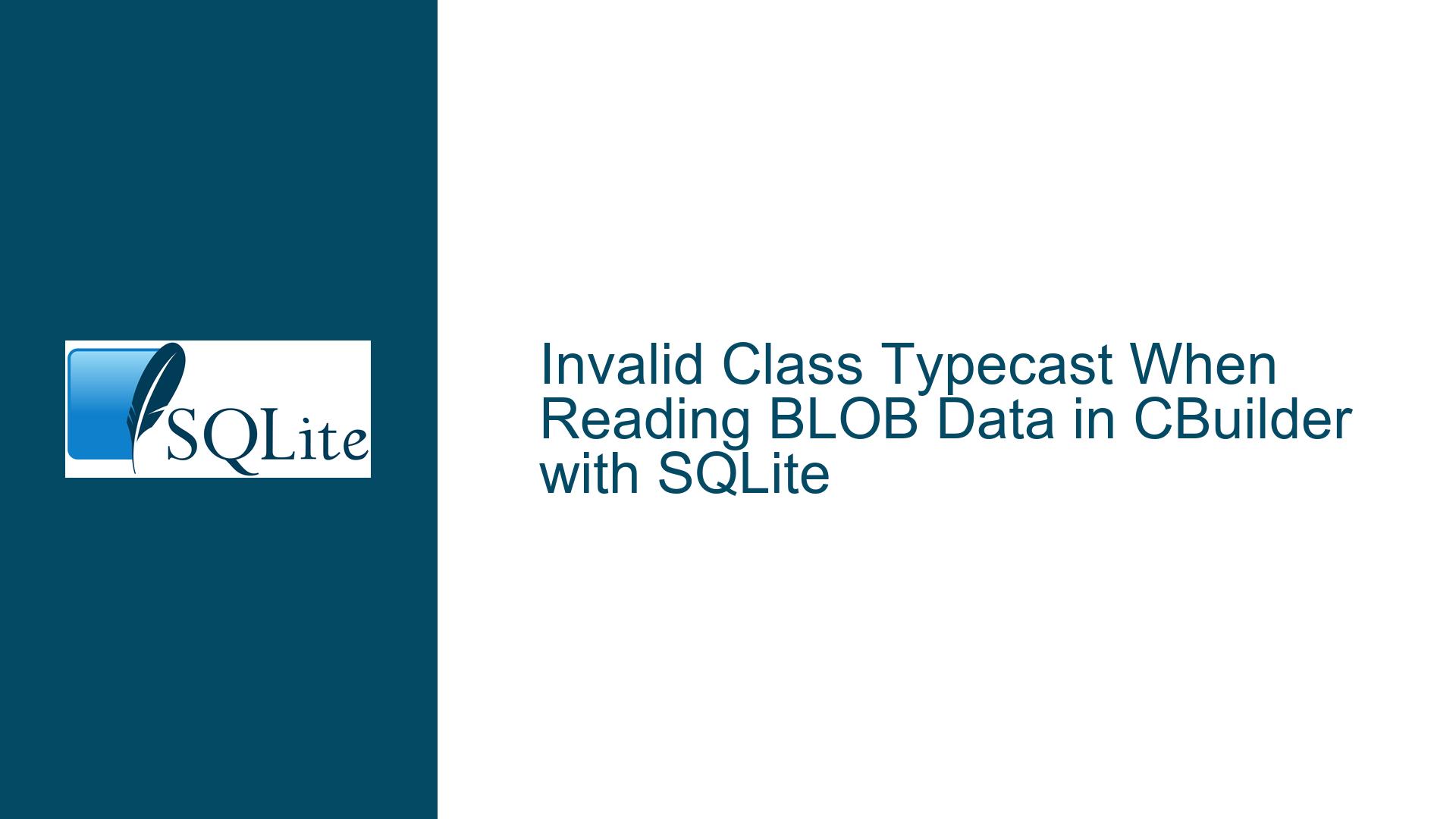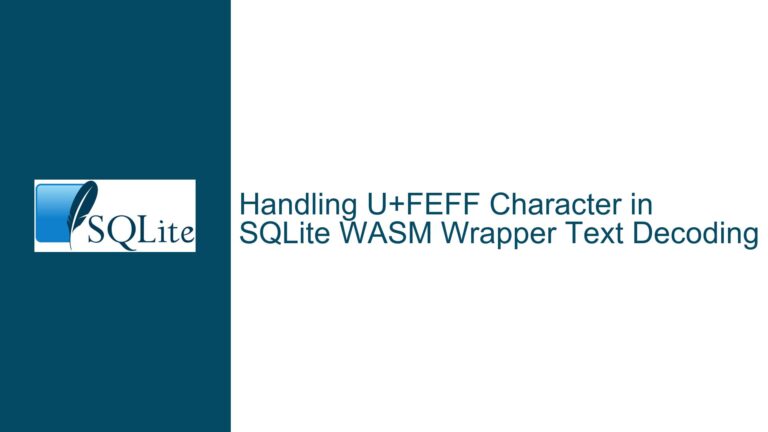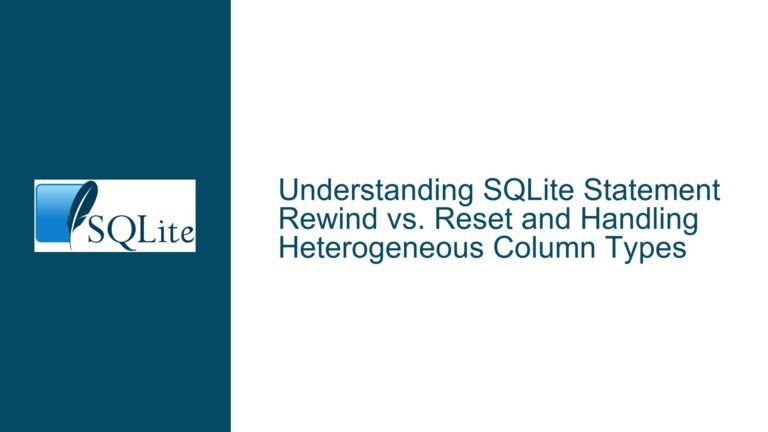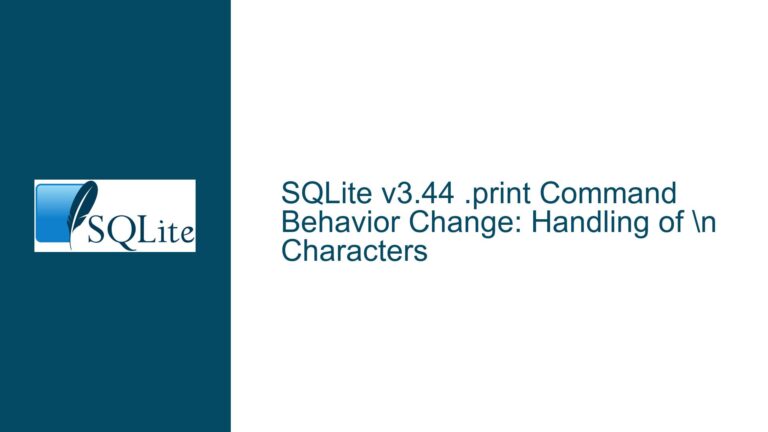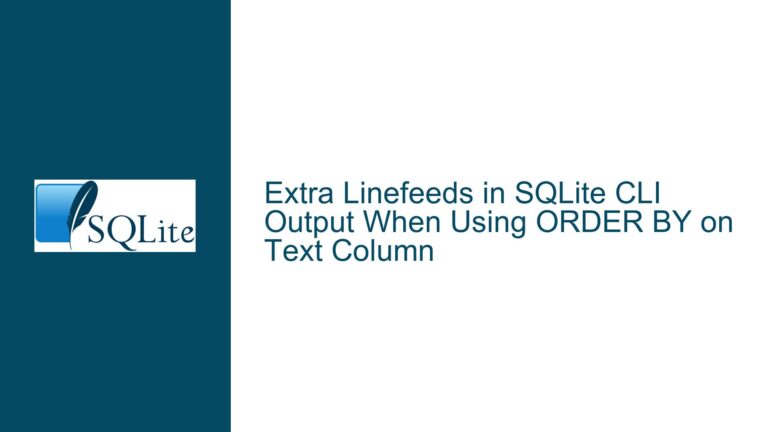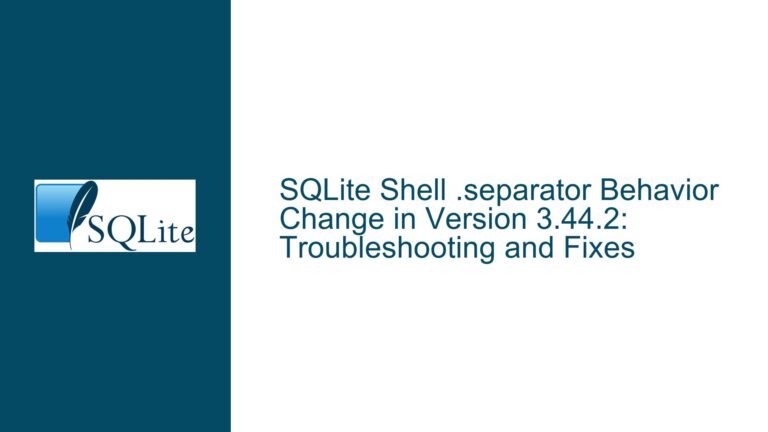Invalid Class Typecast When Reading BLOB Data in CBuilder with SQLite
SQLite BLOB Data Handling and Invalid Class Typecast in CBuilder
When working with SQLite databases in CBuilder, one common issue that developers encounter is the "invalid class typecast" error when attempting to read BLOB (Binary Large Object) data. This error typically arises when there is a mismatch between the expected field type and the actual field type in the database. Specifically, the error occurs when the code attempts to cast a TBytesField to a TBlobField, which are not compatible types. Understanding the nuances of these field types and how to handle them correctly is crucial for resolving this issue.
The TBlobField class in CBuilder is designed to handle variably sized binary data, which is how BLOBs are typically managed in SQLite. However, SQLite treats BLOBs as fixed-size data once they are stored in the database. This discrepancy can lead to confusion when retrieving BLOB data, as the field type in the database might be interpreted as a TBytesField instead of a TBlobField. This misinterpretation is the root cause of the "invalid class typecast" error.
To resolve this issue, it is essential to understand the differences between TBlobField and TBytesField, how SQLite handles BLOB data, and the correct way to cast and manipulate these fields in CBuilder. This guide will provide a detailed overview of the issue, explore the possible causes, and offer step-by-step troubleshooting steps and solutions to fix the problem.
Interrupted Write Operations Leading to Index Corruption
The "invalid class typecast" error when reading BLOB data in CBuilder can be attributed to several underlying causes. The primary cause is the mismatch between the expected field type (TBlobField) and the actual field type (TBytesField) in the database. This mismatch often occurs due to the way SQLite handles BLOB data and how CBuilder interprets these fields.
SQLite stores BLOB data as fixed-size binary objects once they are written to the database. When retrieving this data, CBuilder may interpret the field as a TBytesField, which is designed to handle fixed-size binary data. However, the code may attempt to cast this field to a TBlobField, which is intended for variably sized binary data. This incompatible cast results in the "invalid class typecast" error.
Another contributing factor is the use of C-style casts in the code. C-style casts are a shorthand for type conversion and can lead to runtime errors if the cast is not compatible with the actual object type. In the context of CBuilder and SQLite, using a C-style cast to convert a TBytesField to a TBlobField is not appropriate and will result in the "invalid class typecast" error. Instead, developers should use static_cast or dynamic_cast for type conversions, as these casts provide compile-time type checking and are safer to use.
Additionally, the issue may be exacerbated by the lack of proper error handling and type checking in the code. Without proper checks to ensure that the field type is compatible with the expected type, the code may attempt to perform an invalid cast, leading to runtime errors. Proper error handling and type checking are essential for preventing such issues and ensuring that the code behaves as expected.
Implementing Proper Type Casting and BLOB Handling in CBuilder
To resolve the "invalid class typecast" error when reading BLOB data in CBuilder, developers need to implement proper type casting and BLOB handling techniques. The following steps outline the troubleshooting process and provide solutions to fix the issue.
Step 1: Verify the Field Type Before Casting
Before attempting to cast a field to a specific type, it is crucial to verify the actual field type. This can be done using the ClassName method, which returns the class name of the field. By checking the class name, developers can ensure that the field is of the expected type before performing any type casting.
TField* field = Query->FieldByName("MainData");
if (field->ClassName() == "TBlobField") {
TBlobField* blobField = static_cast<TBlobField*>(field);
// Proceed with BLOB handling
} else if (field->ClassName() == "TBytesField") {
TBytesField* bytesField = static_cast<TBytesField*>(field);
// Handle fixed-size binary data
} else {
// Handle unexpected field type
}
In this example, the code checks the class name of the field before performing the cast. If the field is a TBlobField, it proceeds with BLOB handling. If the field is a TBytesField, it handles the fixed-size binary data accordingly. This approach prevents the "invalid class typecast" error by ensuring that the cast is only performed on compatible field types.
Step 2: Use static_cast or dynamic_cast for Type Conversion
Instead of using C-style casts, developers should use static_cast or dynamic_cast for type conversion. These casts provide compile-time type checking and are safer to use, as they ensure that the cast is compatible with the actual object type.
TField* field = Query->FieldByName("MainData");
if (field->ClassName() == "TBlobField") {
TBlobField* blobField = static_cast<TBlobField*>(field);
// Proceed with BLOB handling
} else if (field->ClassName() == "TBytesField") {
TBytesField* bytesField = static_cast<TBytesField*>(field);
// Handle fixed-size binary data
} else {
// Handle unexpected field type
}
In this example, static_cast is used to perform the type conversion. This cast ensures that the conversion is only performed if the field is of the expected type, preventing the "invalid class typecast" error.
Step 3: Implement Proper Error Handling and Type Checking
Proper error handling and type checking are essential for preventing runtime errors and ensuring that the code behaves as expected. Developers should implement checks to ensure that the field type is compatible with the expected type before performing any type casting.
try {
TField* field = Query->FieldByName("MainData");
if (field->ClassName() == "TBlobField") {
TBlobField* blobField = static_cast<TBlobField*>(field);
// Proceed with BLOB handling
} else if (field->ClassName() == "TBytesField") {
TBytesField* bytesField = static_cast<TBytesField*>(field);
// Handle fixed-size binary data
} else {
throw Exception("Unexpected field type: " + field->ClassName());
}
} catch (Exception& e) {
// Handle the exception
ShowMessage("Error: " + e.Message);
}
In this example, the code uses a try-catch block to handle any exceptions that may occur during the type casting process. If the field type is unexpected, an exception is thrown, and the error is handled appropriately. This approach ensures that the code does not attempt to perform an invalid cast, preventing the "invalid class typecast" error.
Step 4: Use the Correct Field Type for BLOB Data
To avoid the "invalid class typecast" error, developers should ensure that the correct field type is used for BLOB data. In CBuilder, the TBlobField class is designed to handle variably sized binary data, while the TBytesField class is designed to handle fixed-size binary data. When working with BLOB data in SQLite, developers should use the TBlobField class to ensure compatibility.
TStream* MainStream = new TMemoryStream();
Query->FieldByName("MainData")->SetFieldType(ftBlob);
TBlobField* mainField = static_cast<TBlobField*>(Query->FieldByName("MainData"));
mainField->SaveToStream(MainStream);
In this example, the code sets the field type to ftBlob and uses the TBlobField class to handle the BLOB data. This approach ensures that the field type is compatible with the expected type, preventing the "invalid class typecast" error.
Step 5: Ensure Proper Database Schema Design
Proper database schema design is essential for preventing issues when working with BLOB data. Developers should ensure that the database schema is designed to handle BLOB data correctly and that the field types are consistent with the expected types in the application code.
CREATE TABLE MyTable (
ID INTEGER PRIMARY KEY,
MainData BLOB
);
In this example, the MainData column is defined as a BLOB type in the database schema. This ensures that the field type is consistent with the expected type in the application code, preventing the "invalid class typecast" error.
Step 6: Use SQLite’s BLOB Handling Functions
SQLite provides several functions for handling BLOB data, such as sqlite3_blob_open, sqlite3_blob_read, and sqlite3_blob_write. These functions allow developers to read and write BLOB data directly from the database, without the need for intermediate field types.
sqlite3_blob* blob;
int rc = sqlite3_blob_open(db, "main", "MyTable", "MainData", rowid, 0, &blob);
if (rc == SQLITE_OK) {
char buffer[1024];
int size = sqlite3_blob_bytes(blob);
sqlite3_blob_read(blob, buffer, size, 0);
// Process the BLOB data
sqlite3_blob_close(blob);
}
In this example, the code uses SQLite’s sqlite3_blob_open function to open a BLOB handle and sqlite3_blob_read function to read the BLOB data. This approach allows developers to handle BLOB data directly, without the need for intermediate field types, preventing the "invalid class typecast" error.
Step 7: Implement Database Backup and Recovery
Implementing database backup and recovery procedures is essential for preventing data loss and corruption when working with BLOB data. Developers should regularly back up the database and implement recovery procedures to ensure that the data can be restored in the event of a failure.
-- Backup the database
sqlite3_backup_init(destDb, "main", srcDb, "main");
sqlite3_backup_step(destDb, -1);
sqlite3_backup_finish(destDb);
-- Restore the database
sqlite3_backup_init(srcDb, "main", destDb, "main");
sqlite3_backup_step(srcDb, -1);
sqlite3_backup_finish(srcDb);
In this example, the code uses SQLite’s sqlite3_backup_init, sqlite3_backup_step, and sqlite3_backup_finish functions to back up and restore the database. This approach ensures that the data can be restored in the event of a failure, preventing data loss and corruption.
Step 8: Use PRAGMA Statements for Database Optimization
SQLite provides several PRAGMA statements that can be used to optimize the database and improve performance when working with BLOB data. Developers should use these PRAGMA statements to ensure that the database is optimized for BLOB handling.
-- Enable WAL mode for better concurrency
PRAGMA journal_mode=WAL;
-- Set the page size for better performance
PRAGMA page_size=4096;
-- Enable auto-vacuum to reduce database fragmentation
PRAGMA auto_vacuum=FULL;
In this example, the code uses SQLite’s PRAGMA statements to enable WAL mode, set the page size, and enable auto-vacuum. These optimizations improve the performance of the database when working with BLOB data, preventing issues such as the "invalid class typecast" error.
Step 9: Test and Validate the Code
Testing and validating the code is essential for ensuring that the "invalid class typecast" error is resolved and that the code behaves as expected. Developers should thoroughly test the code with different scenarios and validate the results to ensure that the issue is resolved.
// Test case 1: Valid BLOB data
TStream* MainStream = new TMemoryStream();
Query->FieldByName("MainData")->SetFieldType(ftBlob);
TBlobField* mainField = static_cast<TBlobField*>(Query->FieldByName("MainData"));
mainField->SaveToStream(MainStream);
// Validate the results
// Test case 2: Invalid field type
try {
TField* field = Query->FieldByName("MainData");
if (field->ClassName() == "TBlobField") {
TBlobField* blobField = static_cast<TBlobField*>(field);
// Proceed with BLOB handling
} else if (field->ClassName() == "TBytesField") {
TBytesField* bytesField = static_cast<TBytesField*>(field);
// Handle fixed-size binary data
} else {
throw Exception("Unexpected field type: " + field->ClassName());
}
} catch (Exception& e) {
// Handle the exception
ShowMessage("Error: " + e.Message);
}
In this example, the code includes test cases for valid BLOB data and invalid field types. The results are validated to ensure that the code behaves as expected and that the "invalid class typecast" error is resolved.
Step 10: Document the Code and Best Practices
Documenting the code and best practices is essential for ensuring that the issue is resolved and that the code can be maintained and extended in the future. Developers should document the code, including the type casting and BLOB handling techniques, and provide best practices for working with BLOB data in CBuilder and SQLite.
/**
* Reads BLOB data from the database and saves it to a stream.
* @param Query The query object containing the BLOB data.
* @param MainStream The stream to save the BLOB data to.
* @throws Exception If the field type is unexpected.
*/
void ReadBlobData(TQuery* Query, TStream* MainStream) {
try {
TField* field = Query->FieldByName("MainData");
if (field->ClassName() == "TBlobField") {
TBlobField* blobField = static_cast<TBlobField*>(field);
blobField->SaveToStream(MainStream);
} else if (field->ClassName() == "TBytesField") {
TBytesField* bytesField = static_cast<TBytesField*>(field);
// Handle fixed-size binary data
} else {
throw Exception("Unexpected field type: " + field->ClassName());
}
} catch (Exception& e) {
// Handle the exception
ShowMessage("Error: " + e.Message);
}
}
In this example, the code is documented with comments that describe the purpose of the function, the parameters, and the exceptions that may be thrown. This documentation ensures that the code can be maintained and extended in the future, preventing the "invalid class typecast" error.
Conclusion
The "invalid class typecast" error when reading BLOB data in CBuilder with SQLite is a common issue that can be resolved by understanding the differences between TBlobField and TBytesField, using proper type casting techniques, and implementing proper error handling and type checking. By following the troubleshooting steps and solutions outlined in this guide, developers can ensure that the issue is resolved and that the code behaves as expected. Proper database schema design, BLOB handling techniques, and database optimization are also essential for preventing the issue and ensuring that the database performs well when working with BLOB data.
